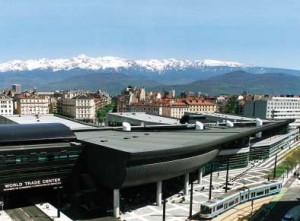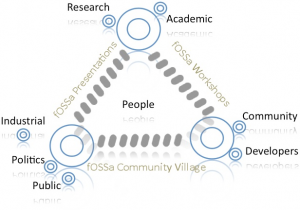About
Here is some text we publish when we created the 2010 Edition.. right below, the “pitch” of the 2010 Edition followed (far below) by the Conference Identity (check the section “Let’s share some thoughts”).
Take your time and have a nice reading!
|
This conference is achieving a prominent role in the Free Open Source Software arena year by year. The current debates between Google and Oracle demonstrate the crucial role that open source software is playing nowadays in information and communication technologies. At the same time, looking at the major software organizations only, the evolution of open source software appears incomplete, since this model is spreading rapidly on an ever-growing number of territories. The Arduino project, which is open source applied to hardware, is a clear example. Considering the strategic actions that the most important industries are undertaking nowadays, after having understood the important role that open source software is playing in their business, the second edition of fOSSa conference presents this phenomenon as a new social paradigm. It aims at answering the following questions:
fOSSa 2010 will welcome various European decision makers and well-known free software organizations, such as Apache, Arduino, Debian, Gnome, Eclipse Foundation, Mozilla, Ubuntu, Engineering Group, Fraunhofer Fokus, Irill, Plume, QualiPSo and FossBazaar. Moreover, the conference includes several workshops, such as install parties and demos. We hope speakers & participants will enjoy the 2010 edition as much as we do in organizing such a free expression conference. Grenoble is a region full of great FLOSS ressources. – fOSSa conference where Free Open Source Software meets academia |
|
- Are you still with us? oki, then, let’s share some thoughts…
- The history of F/OSS can be traced back to academic origins…
Distributing source code under a permissive license was the de facto rule in academia in the 70s. In 1969, the first connection was between the University of California Los Angeles and the Stanford Research Institute:
“On October 29th, 1969, two distant ARPANET computers exchanged a message for the first time: it was all of two letters “lo.” (by Leonard Kleinrock) and it crashed the entire system! This work laid the groundwork for what we call today the Internet.”
Since then, the Internet has become ubiquitous, faster and increasingly accessible to non-technical communities. Social networking and collaborative services have grown rapidly, enabling people to communicate and share interests in many other ways. Let’s face it, 40 years ago, Academia met the Open Source, Open System and Open Standards.
- OSS has changed in time…
Open source was born in a context of hackers, many of them working at universities, an IT generation interested in technology and ethical values. FOSS is becoming a wide spread paradigm throughout the software industry, and its alignment with academic goals tends to be forgotten. Sometimes, OS may be seen as a “window dressing” for tradition proprietary products. New business models are arising (e.g. SaaS, Cloud). We are facing a digital native generation that is oriented toward technology and services “consumption”. Ethical values seem to have been set aside.
- What’s next?
fOSSa steering committee members believes that software innovation is a value creation process that needs a new joint collaboration of industries, academia and F/OSS experts.
So … it’s time to meet again and discuss together about the most interesting topics of OS at fOSSa Conference. OSS model is a value creation process that needs a new joint collaboration of industries, academia and OS experts…
Together, let’s put the OSS back at the crossing roads of Industry and Research!
– fOSSa conference where Free Open Source Software meets academia






